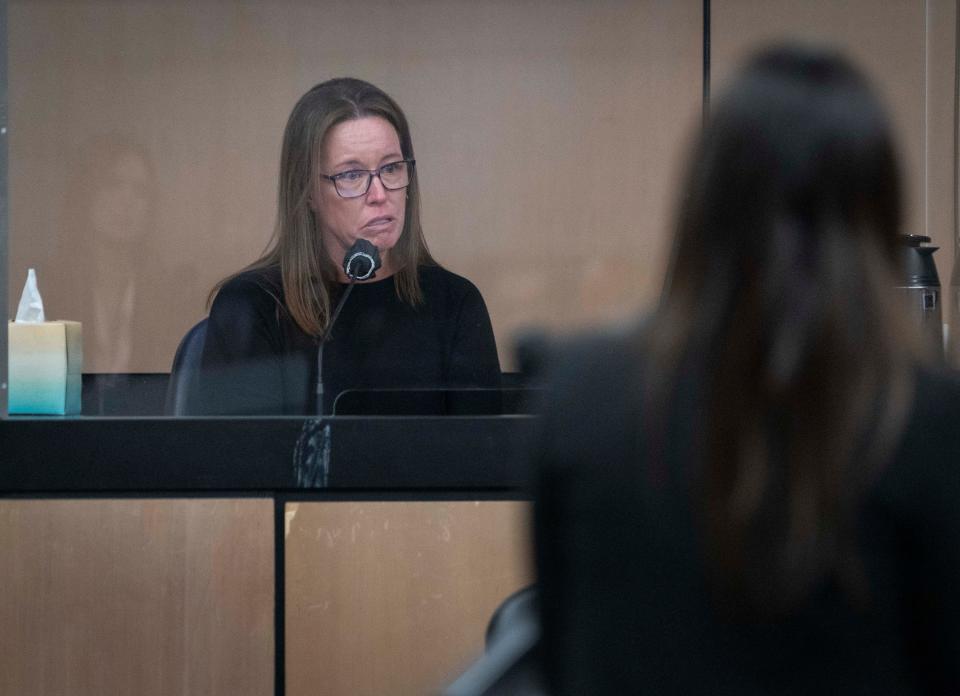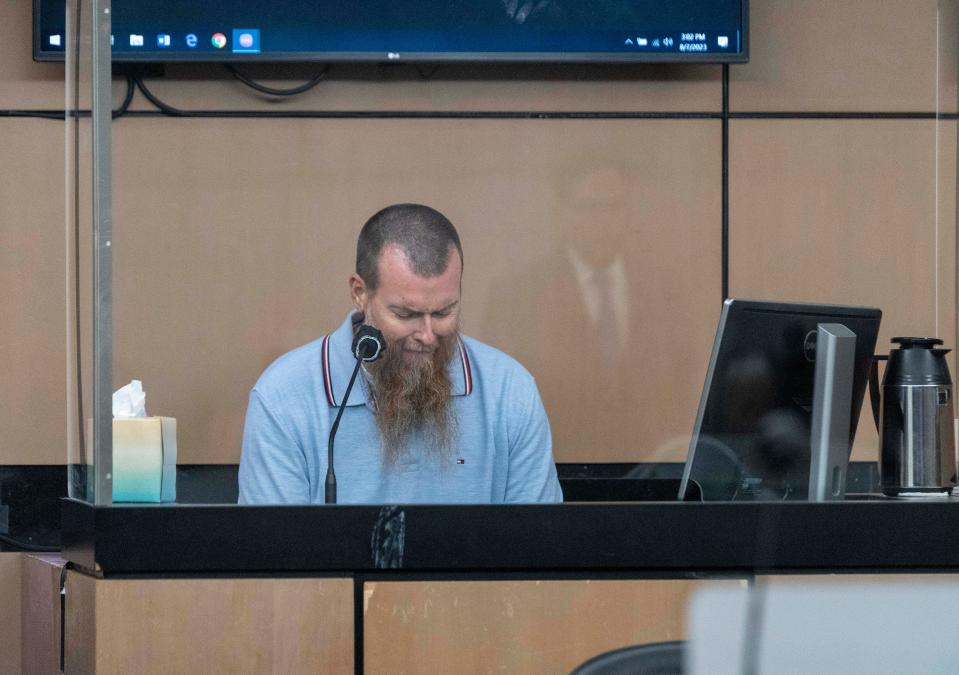Husband sentenced to prison for killing ailing wife outside of Boynton Beach nursing home
WEST PALM BEACH — The people who filed into the courtroom Monday were family, but the space between them was tense. Some glanced in the others' direction as they settled in for the final court hearing of Pamela Kruspe's killer. Others stared straight ahead, their backs rigid.
Stephen Kruspe sat shackled between his defense attorneys. He nodded once to his son Matthew before turning to face the judge. There was a time when Matthew hated his father for what he did. His sister and brother still do.
Stephen Kruspe shot their 61-year-old mother to death outside her assisted-living facility in Boynton Beach in 2017. Pamela Kruspe, his wife of 42 years, suffered from dementia and had reportedly spoken about suicide for months.
Fractured by their father's decision to cut her suffering short, the three siblings and their loved ones made emotional bids before the judge Monday: one side demanding justice for the mother, the other in search of freedom for the father.
Circuit Judge Caroline Shepherd listened to nearly three-and-a-half hours of testimony before she sentenced Kruspe, a 69-year-old Marine Corps veteran, to 20 years in prison for manslaughter by assisted suicide with a firearm, with credit for the six years he has spent in jail since his arrest.
His devotion to his wife was admirable, Shepherd said. His decision to end her life was not.
In-depth: Police records outline night husband shot wife with dementia

Murder, mercy or manslaughter? Husband's story changed
The six years between Pamela Kruspe's death and her husband's conviction did little to mend the rift within their family. If anything, Stephen Kruspe's refusal to plead guilty to a crime he once confessed to only worsened the tension.
Some testified Monday that the longer Kruspe had maintained his innocence, the more clearly they saw him as calculated and controlling — willing not only to kill his wife but also to change his story to avoid the consequences.
Kruspe told police on March 27, 2017, that he shot his wife to death because she asked him to. They charged him with first-degree murder. His story changed this year after forensic analysis revealed Pamela Kruspe's DNA on the gun, indicating that she may have pressed the weapon against her chest or helped her husband pull the trigger.
Kruspe brought the gun to the assisted-living facility to snap his wife out of her fixation with death, his defense attorney Chris Haddad said — not to kill her, despite what he told investigators in the aftermath of the shooting. His memory had been addled by stress, the attorney said Monday, offering Shepherd an abbreviated version of what a doctor would have explained to jurors if the case proceeded to trial.
The Palm Beach County State Attorney's Office lowered the charge from first-degree murder to second-degree murder, then to manslaughter by assisted suicide after Kruspe refused to plead guilty still. His daughter, Stephanie Wilhelm, said she agreed to the reduced charge in hopes that it would bring "long overdue" peace to her family, not because she believes her father's actions were anything less than murder.
"You have shown me who you must have been my whole life, who I couldn't see until now," she told him Monday. "A controlling, selfish liar."
A caretaker's nightmare: Is it mercy to kill one with dementia?

Doctors say Pamela Kruspe was misdiagnosed
Kruspe didn't react to her testimony, nor to that of anyone else who asked that he spend the rest of his life in prison. A group of relatives rows behind him answered their calls for punishment with a shake of a head or a loudly whispered rebuke.
What Wilhelm called murder, her brother Matthew called "an act of love." He told the judge that his father was a "fixer," that he had been that way ever since his time in the military. The rapid deterioration of his mother was the one thing he couldn't fix.
Two doctors testified Monday that Pamela Kruspe had been misdiagnosed with Alzheimer's disease. Her medical records and autopsy report suggest that she instead suffered from frontotemporal dementia, a more aggressive degenerative neurological disease that can manifest in hallucinations, delusions, violence and a "complete breakdown" of personality.
"They know they're going to die eventually," said Dr. James Merikangas. "They'd rather die sooner without the suffering."
That's exactly what Pamela Kruspe wanted, her husband said. He addressed the judge last, his voice and words formal.
"I would like to express my remorse and contrite spirit over all the suffering that I have caused," Kruspe said. "I did not intend to kill my wife. I certainly did not murder her."
Pamela Kruspe was a marathon runner and an employee at the clerk of courts' Delray Beach office. According to Kruspe, she began to withdraw in 2012, shedding hobbies and relationships without warning or reason.
She began deteriorating rapidly in April 2016. She sometimes threatened to kill Kruspe, he said, each time changing her mind and promising to kill herself instead.
Each threat prompted a hospitalization under Florida's Baker Act. Pamela Kruspe was admitted into an assisted-living facility in July 2016, Kruspe said, and the anguish she felt there was unbelievable.
She didn't feel safe at Parkside Inn, he said. She felt that no one loved her, that no one ever came to visit her, though her husband visited her nearly every day. She felt there were too many "crazy people" around her — that she was trapped, and would be forever.
"If I have to stay here, I'm going to kill myself," Kruspe said she told him. "I want you to kill me."
Pamela Kruspe's relatives testified over and over again Monday that they had loved her, had been willing to drop everything to support her — where was that support when they needed it most? Kruspe asked.
"It seemed nonexistent," he said.

Pamela Kruspe was not a willing participant in her own death, judge decides
Kruspe faced between 20 to 30 years in prison, but Haddad said his willingness to accept responsibility and Pamela Kruspe's alleged participation in her own demise warranted a lighter sentence.
Assistant State Attorney Mathri Thannikkotu, who inherited the case this year from former prosecutor Reid Scott, questioned how a guilty plea six years later amounted to acceptance of responsibility, and she rebutted the idea that Pamela Kruspe was a willing participant in her own death.
Kruspe's wife was a "diminished version of herself," Thannikkotu said, prone to impulsivity and in need of a caretaker who could adapt — not kill her when the burden became too great.
Shepherd agreed. Pamela Kruspe was "losing herself, becoming a shadow of herself, not able to make decisions for herself," the judge said. To present her with a loaded gun, then call the ensuing tragedy her decision, was wrong.
"She was vulnerable. She needed your help and your support," Shepherd said. "You may believe that you supported her in the way you thought she needed it — but if that were the case, you wouldn't be sitting here before me now."
Both sides of the courtroom gallery quieted. Kruspe didn't look at either as deputies escorted him from the courtroom a final time.
Hannah Phillips is a journalist covering public safety and criminal justice at The Palm Beach Post. You can reach her at hphillips@pbpost.com.
This article originally appeared on Palm Beach Post: Marine vet who killed ailing wife sentenced to decades in prison

